|

songs | interviews | photos | tours | boots | press releases | timeline
Pitch (US)
Washington, D.C. area
October 1998
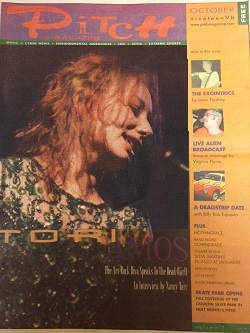
TORI AMOS
Interview and photos by Nancy Tarr
On August 5, 1998 seven journalists and I interviewed Tori Amos on the telephone. The discussion that followed was lively and at times lighthearted. Mostly, however, it was clouded by the reality behind the conception of "from the choirgirl hotel" her latest record.
In 1996, after two years of touring, an exhausted Tori Amos miscarried her first child. Tori explained that she had a lot of soul searching and questions on the how's and why's of such a tragedy.
Life is a journey and for many a struggle. Some people choose to ignore the inner conflict that goes on in the subconscious realm and some people are driven to do something about it. Tori Amos is driven and, in some ways, almost possessed by her internal demons. For Tori, the journey has been anything but easy.
It is a rare gift to speak the truth and to express it in art.
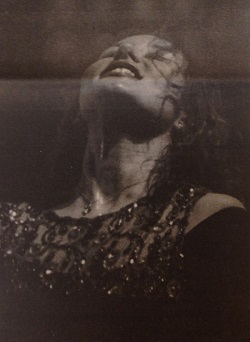
PiTCH: How do you create a place to express truth?
TORI: I think that the last record "Boys for Pele" was very much about my own language and more about a woman's journey to gain her power. This record ("from the choirgirl hotel") isn't as distant as that. It is pretty clear what I am talking about, although I use a lot of metaphor. I miscarried. I hadn't planned on making another record, but when we lost the baby it was pretty hard to know how to wake up in the morning and continue with my life. I spent a lot of time by the river and I would watch the river for hours and hours. I would see how the river would have its own internal rhythm and I knew I needed to fill that void within myself. It was very hard to find my strength as a woman and I turned to the water. I would observe it, and I tried to play what I felt and what I had seen. That is really how this work started to come alive. The miscarriage was the seed to this album. This album is about the life force, whether you are so aware of being angry or being in love. I was really present in this record and I saw how tenuous life is.
PiTCH: What happens when the wound heals?
TORI: I think the wound is healing. My goal is to be as aware as I can be. I am sure when I am 80 years old I will still be working on things. I am learning to have a sense of humor. It is hard to say as a writer where your work is going. The inner world is filled with so many unknowns. I really enjoy exploring the things we hide. This comes out with each album. I don't enjoy not growing.
PiTCH: You have gone through a lot of pain and loss in creating this record, but somehow is seems very life affirming.
TORI: A lot of people see themselves as victims, even when you have to stand in line for ice cream. My belief system is changing and being challenged. The wolf is always going to show up at the door. You never know when that is going to happen. It did put the deities in perspective .... I did lose a baby. There are no guarantees. That is what angers me. I think it is a lit that is told to humans. Then they get so disillusioned and disheartened when something bad happens. You give love because it makes you feel something, and you realize that death is a part of life. Everything has a consequence.
PiTCH: Where does mythology fit into your life?
TORI: I am fascinated by mythology. There is a dark night of the soul and what comes out on the other side is enlightenment. We all align with different characters. Some people align with Persephone (the daughter of Zeus and Demeter, goddess of spring). As a performer, Sekhmet the goddess (half lion, half woman Egyptian goddess) resonates with me. She really takes people down into the underworld, in the shape of the snake. She takes Isis on the journey. When you turn the corner on the belly of the snake your deepest fears come up, like confronting your family. When fears come up in you, Sekhmet holds space for you to claim yourself. Creating a place for transformation. Creating a place for transformation for us, the crew and the audience."
PiTCH: What do you look for now with your success?
TORI: Freedom. It is always about that, artistic freedom, and it always has its consequences. Sometimes you don't fit in with the trend of the time. You have to be willing to ride with that freedom. You have to know what you want. Nothing is a given. There are a lot of characters that run through my songs. I switch roles a lot, sometimes there are threats. There is a mixture of many things in the work.
PiTCH: How is the piano getting along with the other instruments? Are they getting along well?
TORI: They are getting along. Obviously, I have changed my playing. You realize what is being covered and whether there is a hole. The bottom is covered here. Sometimes you are playing in between the grooves and the arrangements change as we work on something. Sometimes it is about passing the baton between each other. You can hear it when it is working and when it is not -- when there is a train wreck you can hear it.
PiTCH: What do you think of the spirituality and the new age movement?
TORI: I do not align myself with the new age movement at all. I find it a bit insulting. A lot of the new age movement is about bells and whistles right now. It is not about substance. A lot of people have what I call "doing spirituality." A lot of people "do it" over lunch, like picking up a Prada backpack. A lot of people have not applied it to their life. For instance, what it means to be nice to their friends or to be compassionate. The movement is very hypocritical. There is a price you have to pay if you are going to walk the spiritual path. Either you are holding yourself accountable or not. Spirituality has become such a fad. These teachings are thousands of years old. There is nothing new about it. Within the new age there are esoteric studies. I do think it is great that these pieces are available, however, crystal suppositories don't bring enlightenment.
PiTCH: Your internet fans have been described as being obsessive lost souls or misfits.
TORI: I don't see the audience as lost souls. I see us all searching, even if it is for a good laugh that day. Some people are content to sit on their couch and they have not taken up the exploring passion yet. I do think the media concentrates on those that are on the net. But you do have to figure that there are a lot of people who came to the show, who came to the music who don't have a computer.
PiTCH: What about the negative reaction your music receives?
TORI: I think if you are making work that is vital you are going to have extreme reactions. If you are really bringing up things that push buttons in people, people may want to embrace you or slap you for it. Any good writer has had extreme reactions. If you are politically correct, then I don't think you are doing your work as an artist.
PiTCH: You mentioned that it is hard to play with people you don't trust. How did your musicians gain your trust?
TORI: I sit and study people, sort of like a cat, and I observe for a long time. I can be polite and professional but that is different from really trusting. Trusting comes from people being tested ... integrity of their work, creatively, enhancing their career, can they be manipulated, can they be bought by the record company? We all have our price ... or do we?
PiTCH: What was it like playing in the DC piano bars?
TORI: I played in the piano bars for years and years. You really appreciate it when you can play your own songs. You get a sense of how to sing to people's needs. You have to turn on a dime, you have to change what you are doing. If you aren't communicating to the people in your audience anymore, you have to learn how to shift really quickly. Now, I don't write the set list until 20 minutes before the show.
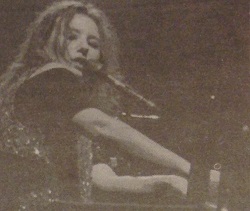
Tori Amos is touring with a band and she said she isn't as lonely as she used to be doing the singer/songwriter performance. Although the audience is larger and further away, the intimacy has been traded with a larger energy force. The piano has changed her role. It is still vital to the performance and yet it works with the other instruments. While writing this record it was pretty clear that the rhythm was built into the structure -- the experience is more primal and the instruments are integrated with each other.
The August 8th performance at the MCI Center was a cacophony of sound. With a camera in hand, for once in my life I was standing in the front row of an arena show. Snapping pictures during the first three songs of the set was a thrilling experience. The audience that was pressed against the stage was enraptured with Toridom. It was a relief when the band left the stage and Tori captured the confessional intimacy of her songs. That night was the first time she performed "Me and a Gun" on this tour. The rendition was heart-wrenching.
I will always hold onto the memory of the first time I saw Tori perform. I was living in Los Angeles at the time and her first record, "Little Earthquakes," had just been released. She was performing at the Roxy, a small intimate venue on Sunset Boulevard. I was one of perhaps a hundred people in the audience. I was sitting next to a woman who attended high school with Tori. The woman turned to me and said, "Her real name is Myra, did you know that?" Whenever I see Tori, I am always thrown back to that first moment. Her earthly style and straddling the piano bench, throwing her flaming mane of hair back and her breathless voice riding up and down on the waves of her intricate life that unfolds before us. Bringing her audience to a fever pitch -- transforming us -- saving our souls. Tori is a preacher and her religion is music.
original article, thanks to Nancy Tarr
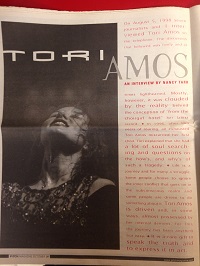 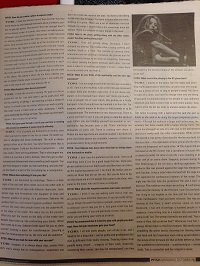
(concert photos from the MCI Center in Washington, D.C - August 8, 1998.)
t o r i p h o r i a
tori amos digital archive
yessaid.com
|